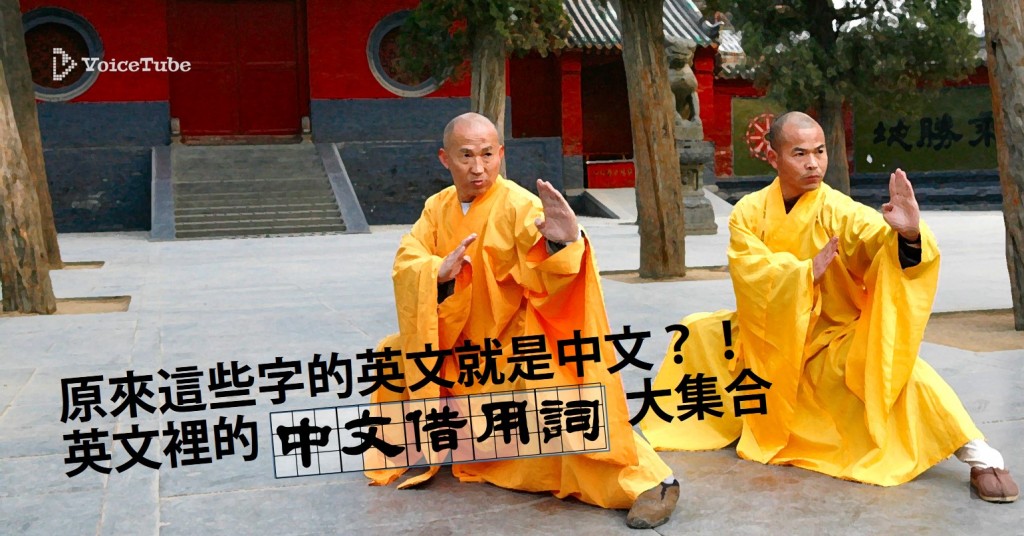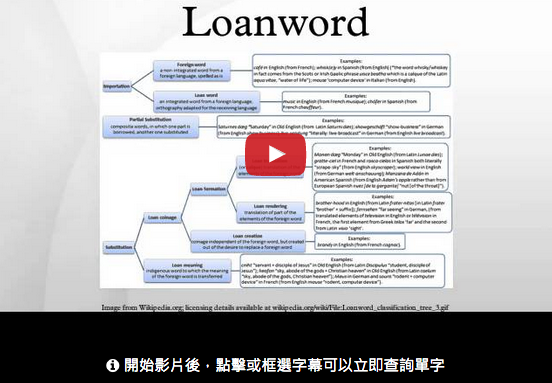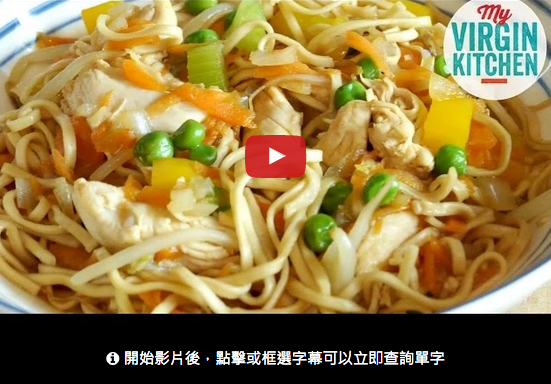出國玩、看電視時,
有沒有突然聽到一個真的不像是英文的字?
其實他不是在愛現外語,
只是很順口的講了「借用語」(loanwords)!
介紹一些來自中華文化的借用語,
以後想用英文講這些字就不用苦惱半天,
因為其實用中文的發音就差不多可以通啦!

「借用語」或者「外來語」的基本解釋是「從外語領養來的,而與母語一模一樣,或者稍微有改的字。」(Loanword: a word adopted from a foreign language with little or no modification.)如果在國外吃中國菜,一定會發現菜單上有奇怪的英文字。而在國內的西洋餐廳吃飯時,也會看到看起來不大像英文的詞語。就像中文有許多字是從英文借來的,這些外來的用語,用久了以後就自然的成為日常言語的一部份。看一下詳細的解說:
讓我們認識一些英文借給中文,還有中文借給英文的借用語!
先參考一些中文裡從英文借來的借用語
阿斯匹靈:Aspirin
比基尼:bikini
卡通:cartoon
起司:cheese
巧克力:chocolate
雪茄:cigar
可樂:cola
酷:cool
高爾夫:golf
吉他:guitar
漢堡:hamburger
荷爾蒙:hormone
夾克:jacket
麥克風:microphone
模特兒:model
尼古丁:nicotine
派對:party
披薩:pizza
布丁:pudding
三明治:sandwich
沙拉:salad
秀:show
沙發:sofa
坦克:tank
接下來是英文裡從中文借來的借用語
因為華人移民到美國的人口相當多,所以來自中華文化的借用詞彙也相當豐富,一起來看看:
1. 中華飲食博大精深
bok choy 白菜(來源是廣東話 “baak6 coi3” 譯音 )
dim sum 廣東話譯音的「點心」
chopsticks 筷子
(“chop” 來源是廣東話速 “cuk1” 的譯音,也是「快」的翻譯,同音的「筷子」就變成 “chop” 加上「棍子」了)
chop suey 中國菜的什錦雜炒
chow mein 炒麵
ginseng 人參;人參製品
oolong 烏龍茶
ramen 拉麵(這個詞的來源到底是不是中國,眾說紛紜,也有人表示是來自日本)
tofu 豆腐
won ton 餛飩;餛飩湯
A: I can’t decide if I want chow mein, lo mein, or fried rice.
A: 我無法決定想要炒麵、撈麵、還是炒飯。
B: Try chop suey, it has everything.
B: 試試看什錦雜炒,它裡面什麼都有。
A: How about fried tofu for appetizer?
A: 那麼開胃菜點炸豆腐好嗎?
B: Great! I’ll also get some won ton soup. We can share.
B: 好!我還要點餛飩湯,我們可以分享。
A: I don’t know how to use these chopsticks.
A: 我不會用筷子。
B: Let’s ask for a fork.
B: 那我們要個叉子吧。
A: This tea you ordered smell so good.
A: 你點的茶好香
B: Have some, it’s oolong.
B: 喝喝看,是烏龍茶。
A: I’ll need some sugar.
A: 我需要一點砂糖
B: …..
A: Just kidding!
B: 開玩笑的啦!
B: We should go to the dim sum restaurant next time.
B: 下次我們去港式點心餐廳。
A: Of course! I’ve been getting home so late because of work. I ate instant ramen for dinner four nights this week. It’s nice to finally enjoy a meal!
A: 當然!我最近工作完回家都好晚了,這個星期四個晚上都吃泡麵當晚餐。出來享受一餐真好!
B: You look tired. I’ll get you some ginseng tea tomorrow. It will repair your energy.
B: 你看來累了。明天我準備人參茶給你,它會修復你的精力。
A: This won ton soup is doing that already. Thank you.
A: 餛飩湯已經幫我恢復很多體力了,謝謝你。
2. 中國功夫的獨特魅力
kung fu 中國功夫
t’ai chi ch’uan 太極拳
wushu 武術
wuxia 武俠
yang 陽
yin 陰
A: Will you lend me a book to read?
A: 你能借我一本書來看嗎?
B: Why? I’ve never seen you read a book.
B: 為什麼?我從來沒有看過你看書。
A: Haha! I am going on a camping trip by myself, and I’ll need something to keep me company.
A: 哈哈!我要一個人去露營,需要一樣東西來陪伴我。
B: I just finished reading some books about feng shui, t’ai chi ch’uan, and TCM (traditional Chinese medicine), interested?
B: 我剛看完一些有關風水、太極拳、還有中醫的書,有興趣嗎?
A: hmmm, sounds exciting…
A: 嗯,聽起來令人興奮…
B: Okay, I know! I am going to find the classic wuxia novels I read in high school. They will keep your imagination running wild in the deep forest.
B: 好的,我知道了!我去找高中時我看的經典武俠小說,它會讓你的想像力在森林深處馳騁。
A: You mean the wuxia stories are like kung fu movies?
A: 你是說武俠的故事是像功夫片一樣?
B: Even better! The characters are complex. They practice martial arts, or wushu. Their yin and yang energies are beautifully displayed, and the story lines have deep meanings.
B: 更好!裡面的角色有深度,都有鍛鍊武術。他們的陰陽能量會優雅的呈現,故事也有深奧的意義。
3. 神秘的東方思想
mahjong 麻將
feng shui 風水
qi (ch’i) 氣
A: Did you move the couch again?
A: 你又移沙發了?
B: I am taking a feng shui class. I got so many ideas, and I don’t know what to do with the living room.
B:我正在上風水課。我有好多的想法,不知道該把客廳怎麼辦。
A: Since you are reorganizing the house, why don’t you make room for a mahjong table?
A: 既然你在重整家裡,乾脆挪點空間出來放個麻將桌?
B: I was thinking about the same thing! But I don’t want any conflicting energies. It’s a total taboo if the family’s qi is blocked.
A: 我剛才正在想同樣的事情!但我不希望有任何能量的衝突。如果家裡的氣被阻止,那是一大禁忌。
A: I don’t think that’s going to happen. All the labor of moving heavy furniture is the same as a daily cardio workout.
A: 我不認為那會發生,移動沉重的家具的勞動跟每天做有氧鍛煉一樣。
4. 儒家與道教也已經成為常聽到的英文詞語
Confucius 孔子
Confucianism 孔子學說;儒學,儒教
Tao 道
Taoism (Daoism) 道教;道家的學說
Zen 佛教的禪;禪宗
A: I am thinking about dropping out college, travelling, and studying philosophy on my own.
A: 我想退學、去旅遊、自己學哲學。
B: Have you taken any intro philosophy courses?
B: 你有讀過任何初級的哲學課程嗎?
A: Not yet, but I am smart, and I got great common sense! I am ready for any challenge life has to throw my way, and I am going to find my zen!
A: 沒有,但我很聰明,也很有常識!我已經準備好應付任何人生給我的挑戰了,我要找到我的禪定!
B: Okay, speaking of common sense, do you know what’s the difference between Confucianism and Taoism?
B: 好,講到常識,你知不知道儒教與道教之間的區別?
A: The what and the what?
A: 什麼跟什麼?
B: Confucianism is the school of thoughts established by Confucius, and Taoism is a branch of philosophy that has influenced many thinkers and writers.
B: 儒家思想是孔子建立的學術,道家是一個影響了的許多思想家和作家的哲學支脈。
A: That sounds confusing.
A: 聽起來滿讓人困惑的。
B: Confucianism also greatly focuses on family values, and consideration of others. Your parents would like to see you finish college, and have a happy and financially secure life, isn’t that some valuable common sense?
B: 儒家思想也極為重視家庭價值觀,並為他人設想。你的父母想看你完成大學學業,並有一個幸福和經濟安全的生活。這是不是個有價值的常識?
A: But I also believe that’s it’s my destiny to follow my own path, and do what my heart desires.
A: 但我也認為,我的命運是要按照自己的路,做我心裡想的事。
B: Well, why don’t you travel during the coming spring break, and then get back onto you path of a college student afterward?
B: 那,你為什麼不利用快到的春假去旅行一下,再回到你身為一個大學生的路上?
A: I’ll think about it.
A: 我會考慮的。
B: There is no need to think. As the Taoists would say, you simply have to accept your Tao.
B: 沒有必要多想,就像道家會說,你只需要接受你的道。
A: My what?
A: 我的什麼?
B: …..
5. 還有更多通用的借用語!
chop chop 快一點(來源是廣東話速速 “cuk1 cuk1” 譯音 )
Hanfu 漢服
kowtow 磕頭
pinyin 拼音
qipao 旗袍
typhoon 颱風
tycoon 企業界的大亨;巨頭
wok 帶把的中國炒菜鍋;鐵鍋
迫不及待想馬上開始練習嗎?
快打開 VoiceTube App 練英文!
✦ 立即下載 >>> https://bit.ly/myenglishissogood
英文單字不要硬背! 藉由 VoiceTube App 看影片,不會的單字反覆聆聽,加上單字測驗練習,聽寫齊下,立刻熟記!

文/王傳瑄
圖/wikimedia CC licensed
作者簡介/VoiceTube看影片學英語
學英文不是艱難的任務,而是一種融入生活的自然態度,今天起,丟掉厚重的教科書,每日鎖定VoiceTube看影片學英語官方部落格,給自己一個流利『用』英語的機會!


